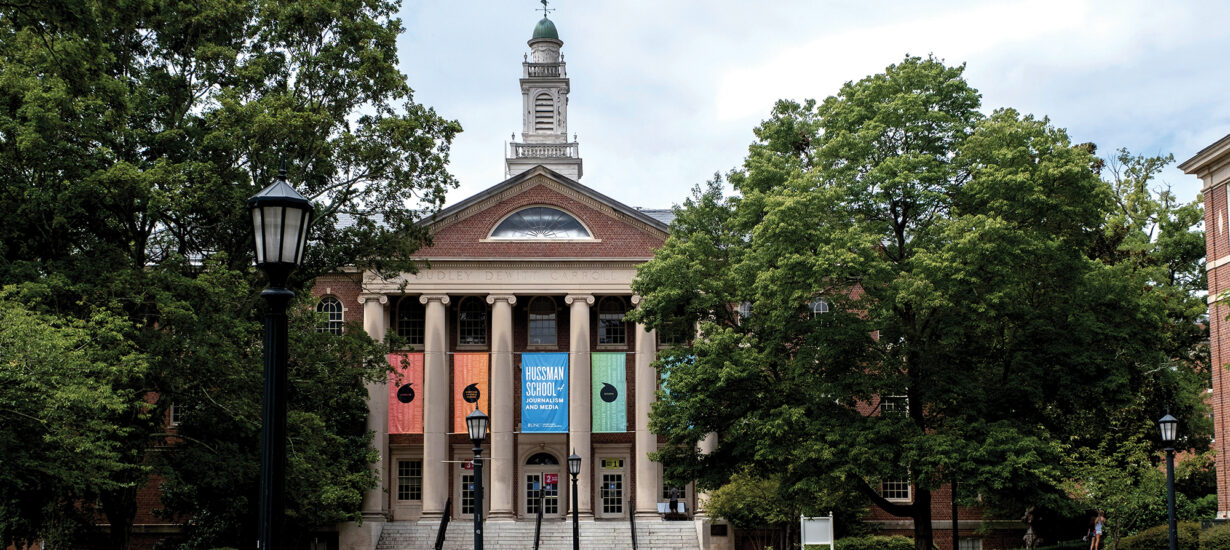Governance Issues, Accreditation Downgrade Linked to Hannah-Jones Controversy

The governing council of the American Association of University Professors passed a resolution in June “resoundingly” condemning the UNC System Board of Governors and the UNC System for perpetuating what it called a climate of institutional racism and violating standards of shared governance and academic freedom at its member institutions.
The vote came a month after the Accrediting Council on Education in Journalism and Mass Communications voted to drop UNC’s Hussman School of Journalism and Media accreditation to “provisional,” saying it has fallen short in meeting council standards for diversity, equity and inclusion.
The two organizations both cited the circumstances surrounding the appointment of Nikole Hannah-Jones ’03 (MA) to a tenured position at the journalism school as part of their reasons for taking action. Hannah-Jones, a former staff writer for The New York Times, won a Pulitzer Prize for commentary for her work on the newspaper’s 1619 Project. UNC announced in April 2021 that Hannah-Jones would join the journalism school as the Knight Chair in Race and Investigative Journalism. The UNC Board of Trustees initially didn’t consider her application for tenure but reversed its decision after protests and critical news reports, voting to grant her tenure. Hannah-Jones turned down the offer and instead joined the faculty at Howard University in Washington, D.C., as the Knight Chair in Race and Journalism.
“While most faculty members in the UNC System seem to enjoy the basic protections of academic freedom, actions by the Board of Governors and campus administrations have placed these protections in jeopardy, making the overall environment for the exercise of academic freedom insecure,” the report concluded.
Founded in 1915, AAUP has 45,000 members and defines fundamental professional values and standards for higher education and advances the rights of academics, according to its website. According to the UNC chapter of AAUP, About 75 of UNC’s roughly 4,000 faculty are AAUP members.
The AAUP vote was informed by a report from its Special Committee on Governance, Academic Freedom and Institutional Racism in the University of North Carolina system, which focused on UNC, while also referencing incidences at Appalachian State, East Carolina, Fayetteville State and Western Carolina universities.
“Unless there’s a wholesale change in the political culture, it’s going to be difficult for the system to change as well,” AAUP senior program officer Anita Levy said.
Several UNC leaders declined to comment on the report when it was released in April, according to The News & Observer. Kimberly van Noort, UNC System senior vice president for academic affairs, responded to Levy in a March letter. She called the report “disheartening” and wrote that Levy offers “a relentlessly grim portrayal of one of the nation’s strongest, most vibrant, and most productive university systems. It’s nearly impossible to square the bleak portrait you’ve created with the thriving campuses we know and love.”
Van Noort acknowledged the UNC System’s challenges and shortcomings but argued the report dismisses the system’s “focus on progress and investment, which has yielded remarkable results across the UNC System over the last several years.” She pointed out North Carolina’s “steady, bipartisan support of higher education” that has allowed universities to lower and freeze tuition, improve graduation rates, recruit faculty and secure raises for employees.
The Accrediting Council on Education in Journalism and Mass Communications also cited the controversy surrounding Hannah-Jones, as well as a lack of diversity in its faculty and curriculum, as factors that led to its decision to downgrade the journalism school, Peter Bhatia, president of the council, told The Charlotte Observer. UNC is among eight journalism schools with provisional accreditation.
In a report based on an October 2021 visit to Hussman, council officials said several of the school’s faculty members and staff, particularly those of color, cited low morale and indicated they were considering leaving the school.
“They said the Hannah-Jones decision and the aftermath is the latest in a series of incidents in which they have felt undervalued and not heard/understood,” the report states.
The council cited issues of diversity and inclusion that led to the downgrade, including a lack of resources for personnel, recruiting, curriculum development and programming.
The council acknowledged recent work by the journalism school’s Access, Belonging, Inclusion, Diversity, and Equity committee as a positive step to remedy the issues, saying the panel “has conducted listening sessions with students and faculty,” and “has plans to update the diversity plan.”
In a statement following the council’s decision, Interim Dean Heidi Hennink-Kaminski acknowledged the journalism school has challenges to overcome, saying it “has not met its own ideals for creating an environment of diversity and inclusion.”
The journalism school “will continue to grow and expand programs initiated prior to the accreditation ruling,” Hennink-Kaminski said in her statement, and administrators would continue “revising promotion and tenure guidelines to specifically recognize and value creative and scholarly work; mentoring and service focused on improving diversity, equity and inclusion; and an assessment of the school’s culture.”
Under the leadership of recently appointed Dean Raul Reis, the school will establish a process for reforms and submit a plan in the fall, Hennink-Kaminski said.
The journalism school’s accreditation will be reevaluated in two years.
— Laurie D. Willis ’86
